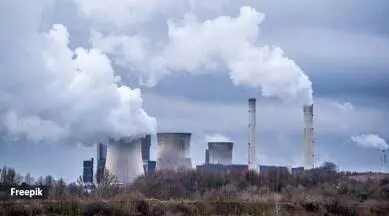
India takes seventh spot in this year's climate change performance index
text_fieldsDubai: India continued to be among the top performers, coming in at number seven on the Climate Change Performance Index this year, up one spot from last year, according to a report released here on Friday during the global climate conference known as COP28.
India has maintained its strong ranking in the categories of greenhouse gas emissions and energy use but has fallen short in the areas of climate policy and renewable energy, as per the previous year's monitoring of the mitigation efforts of 63 countries plus the EU, which accounts for over 90% of the world's greenhouse gas emissions.
While India is the world’s most populous country, it has relatively low per capita emissions, the index said.
“Our data shows that in the per capita GHG category, the country is on track to meet a benchmark of well below 2 degrees Celsius. While it shows a slightly positive trend in the share of renewable energy, this trend is advancing too slowly,” the report based on the index said.
The Climate Change Performance Index (CCPI) country experts reported that India is trying to meet its Nationally Determined Contributions (NDCs), with clear long-term policies in place that focus on promoting renewable energy and providing financial support for domestic manufacturing of renewable energy components.
Despite that, India’s growing energy needs are still being met by its heavy reliance on coal, along with oil and gas, the report pointed out.
“This dependence is a major source of greenhouse gas emissions and causes severe air pollution, especially in the cities,” it said.
India has relatively high taxes on petrol and diesel, which are intended to act as carbon taxes. The impact of these taxes on consumption remains disputed. “While some experts describe them as an effective tool to reduce the consumption of petrol and diesel, others point to the high dependence of the government on these tax revenues,” the report said.
“At the last COP, India, together with China, changed the wording of the cover decision to ‘phase down’ rather than ‘phase out’ fossil fuels. This was a setback for the global commitment to end the fossil fuel era. Some of our experts also report that large-scale renewable energy projects have negatively affected the livelihoods of local communities through land grabs and unequal distribution. Our experts report that policies are largely mitigative, yet they should also focus on transformative adaptation and disaster risk management,” the report said.
The report also pointed out that policymakers should also adopt ecosystem-based solutions and consider equity.
Prime Minister Narendra Modi’s announcement at COP26 that India will achieve net-zero emissions by 2070 shows a lack of ambition and political will, according to our experts, the report said.
The experts therefore called for more effective policy implementation that takes a more bottom-up approach, including the demands of tribal and rural communities.
“Specifically, they call for a faster phase-out of coal, reduced reliance on gas, and expanded renewable energy. The experts want to see the country fulfil its potential in climate action by moving up the timeline for reaching Net Zero no later than 2050. They want to see the creation of people-friendly, climate-friendly, sustainable infrastructure that is affordable, accessible, and available to all, while taking the location’s cultural and social context into account,” it said.
Srinivas Krishnaswamy, CEO, Vasudha Foundation said it is indeed heartening to see India ranked high in the Climate Change Performance Index 2024.
“It is evident that India has taken concrete actions vis-a-vis our NDCs. India’s non-fossil power installed capacity as on date has already around 44 per cent as against the target of 50 per cent by 2030; India’s emission intensity to GDP as on 2019 reduced by 33 per cent to 2005 levels and with this trajectory will far exceed its NDC commitment of reducing its emission intensity to GDP of 45 per cent by 2030 to 2005 levels,” Krishnaswamy said.
“Further, a number of states have also taken concrete actions to address climate change. So in my view, the CCPI results seem to be bang on,” he said. PTI UZM NPK (This story was produced as part of the 2023 Climate Change Media Partnership, a journalism fellowship organized by Internews’ Earth Journalism Network and the Stanley Center for Peace and Security.)
With PTI inputs
























